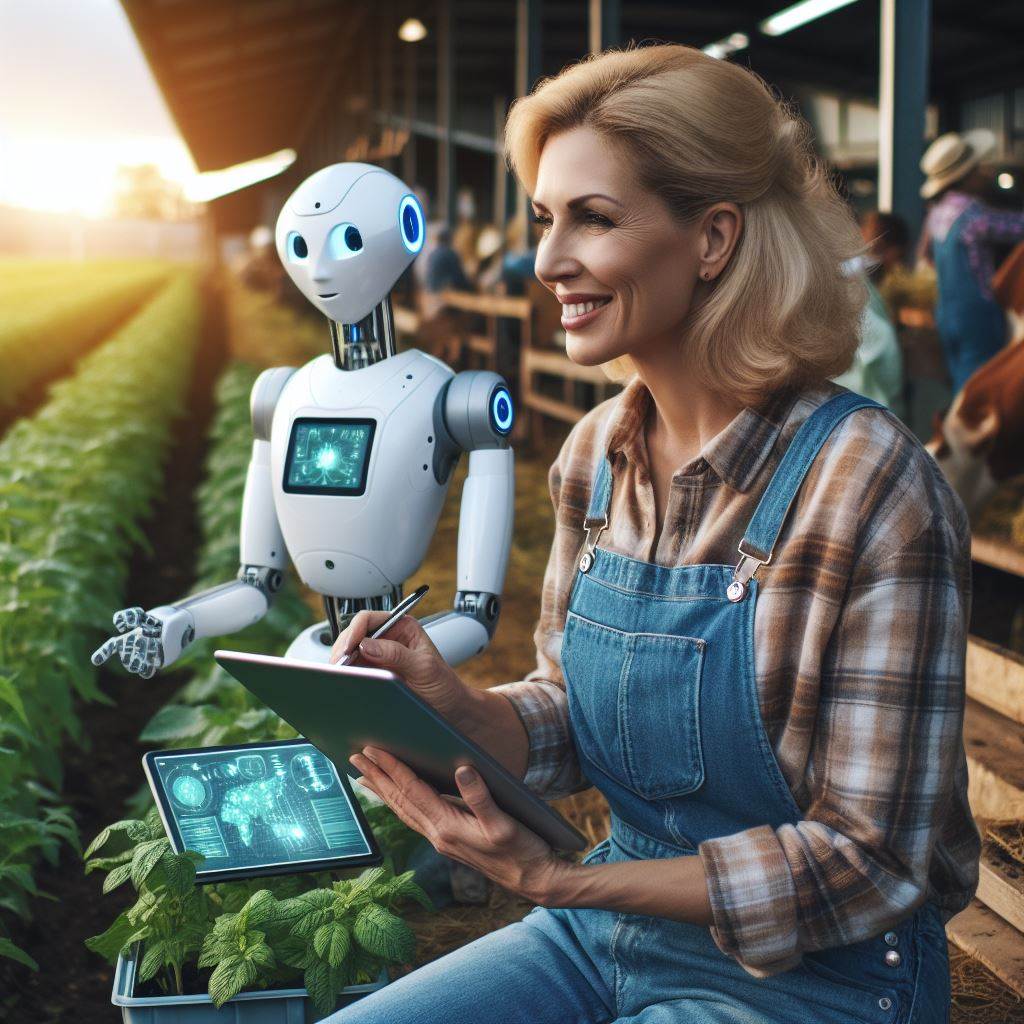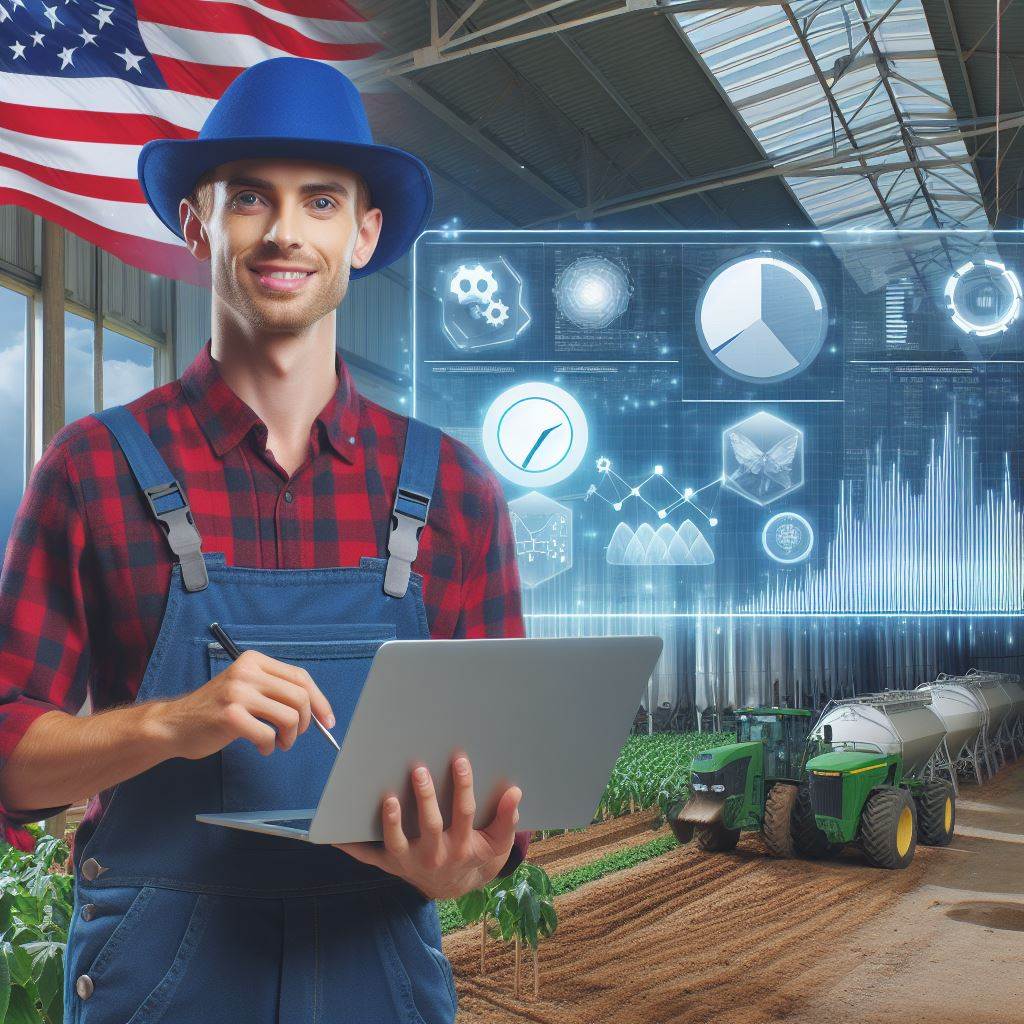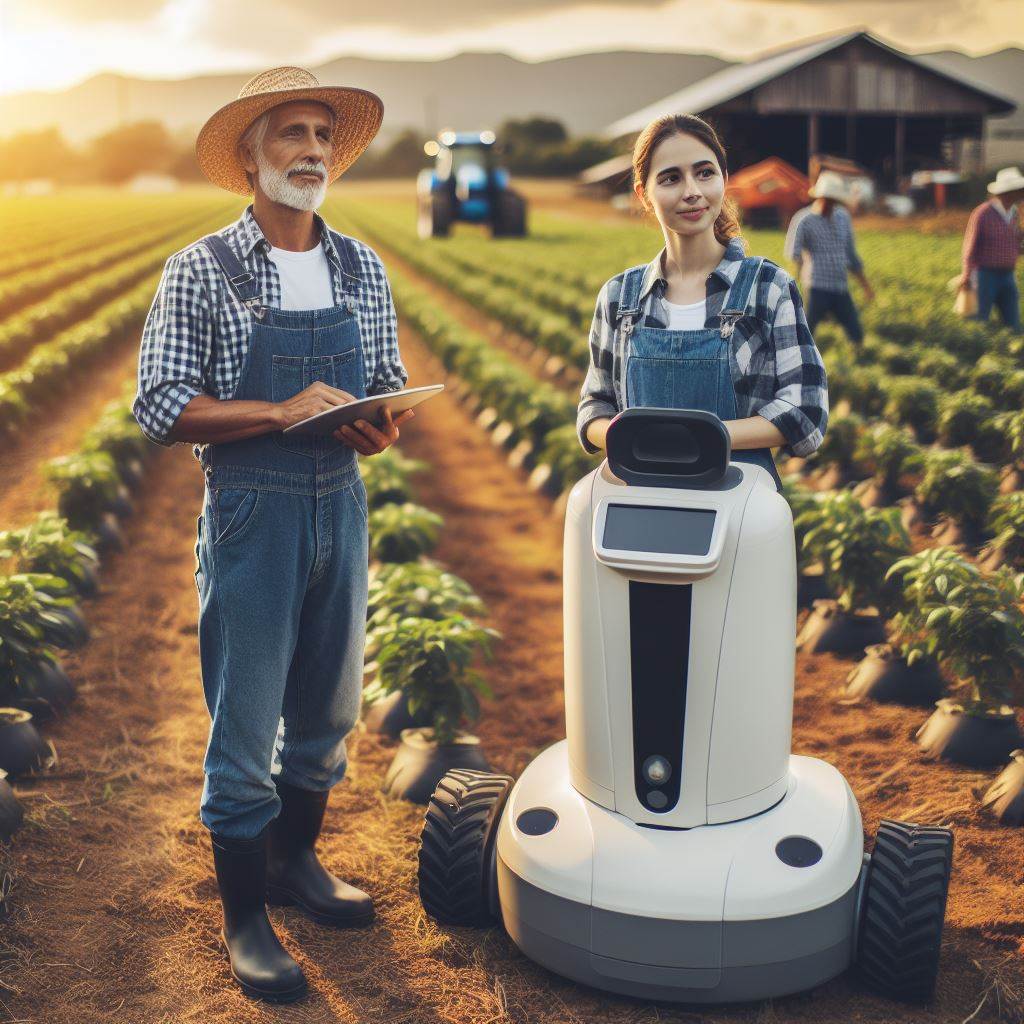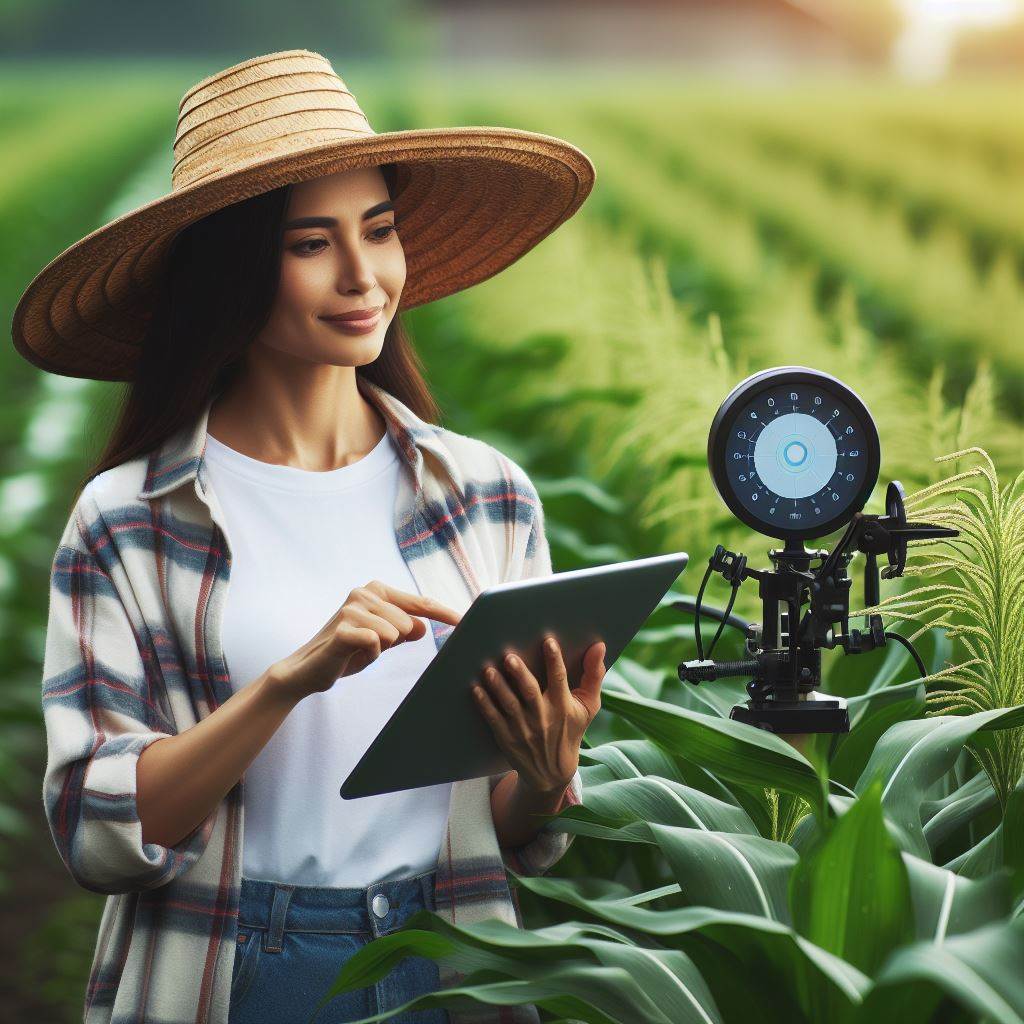Introduction
Smart farming is an innovative approach to agriculture that utilizes technology to optimize crop production and resource management.
With the introduction of AI, smart farming is experiencing a significant transformation that is revolutionizing the industry.
The Role of AI in Smart Farming
AI technology plays a crucial role in improving efficiency and productivity in smart farming practices.
It enables farmers to make data-driven decisions by analyzing and interpreting large volumes of real-time data.
AI algorithms can accurately predict weather patterns, crop diseases, and optimize irrigation and fertilizer usage.
Through machine learning, AI can identify patterns and anomalies in plant growth, enabling early detection of pests or diseases.
Robots equipped with AI can efficiently perform tasks such as seeding, weeding, and harvesting, reducing the need for manual labor.
Drones integrated with AI can monitor crop health, detect nutrient deficiencies, and assess soil conditions with precision.
AI-enabled devices and sensors can automate farm operations, allowing farmers to remotely monitor and control various parameters.
Furthermore, AI-powered predictive analytics assist in predicting market demand, optimizing supply chain logistics, and maximizing profits.
Benefits and Challenges
The growing impact of AI in smart farming brings several benefits, including increased productivity, reduced resource wastage, and improved sustainability.
However, implementing AI in agriculture also poses challenges, such as the high cost of technology and the need for skilled labor and technical expertise.
Furthermore, data privacy and security concerns must be addressed to ensure the protection of valuable farming information.
AI’s growing impact on smart farming holds tremendous potential to revolutionize the agriculture industry.
By leveraging AI technology, farmers can enhance productivity, make informed decisions, and ensure sustainable and efficient farming practices.
Transform Your Agribusiness
Unlock your farm's potential with expert advice tailored to your needs. Get actionable steps that drive real results.
Get StartedDefinition and explanation of AI in smart farming
Definition of AI and its various applications
AI, or Artificial Intelligence, refers to the development of computer systems that can perform tasks that usually require human intelligence, such as visual perception, speech recognition, and decision-making.
In the context of smart farming, AI involves the utilization of advanced algorithms and machines to optimize agricultural processes.
Applications of AI in smart farming
- Precision agriculture: AI technology enables farmers to collect and analyze data from sensors and drones to make informed decisions about crop management. This includes monitoring soil conditions, water usage, and nutrient levels to optimize crop health.
- Automated machinery: AI-powered robots and machines can perform tasks such as planting, harvesting, and even weeding with high precision and efficiency. This reduces the need for manual labor and increases productivity.
- Pest and disease detection: AI algorithms can analyze images and data collected from cameras and sensors to identify pests, diseases, and plant stress. This allows farmers to take immediate action and prevent the spread of infections.
- Climate forecasting: AI models can analyze weather patterns and historical data to provide accurate forecasts. This helps farmers make informed decisions about irrigation, pest control, and other farming practices, considering weather conditions.
- Market analysis: AI algorithms can analyze market trends, consumer behavior, and pricing data to assist farmers in making strategic decisions regarding crop selection, pricing, and marketing strategies.
Importance of AI in optimizing farming processes
AI plays a crucial role in optimizing farming processes, leading to improved efficiency and productivity:
- Data-driven decision-making: AI technology enables farmers to make data-driven decisions based on real-time and historical data. This reduces guesswork and allows for precise adjustments in farming practices.
- Resource optimization: AI algorithms can analyze data from sensors to provide insights into resource usage, such as water and fertilizer. This allows farmers to optimize resource allocation, resulting in reduced waste and cost savings.
- Time-saving: AI-powered machinery and automation streamline various tasks, reducing the time and effort required. Farmers can focus on more critical activities, leading to increased productivity.
- Improved crop health management: AI systems can monitor crop health and alert farmers to potential issues. This enables proactive measures to be taken like adjusting irrigation, applying appropriate treatments, and minimizing crop losses.
Benefits of AI in improving agricultural productivity and efficiency
Integrating AI into smart farming practices offers several benefits in terms of increased productivity and efficiency:
- Higher crop yields: AI-based systems can detect crop stresses, diseases, and nutrient deficiencies at an early stage, allowing prompt action to be taken. This leads to healthier crops and higher yields.
- Reduced environmental impact: AI technologies help optimize resource usage, reducing water and fertilizer waste. This promotes sustainable farming practices and minimizes negative impacts on the environment.
- Minimized labor costs: With AI-powered machinery and automation, farmers can reduce their reliance on manual labor. This results in cost savings associated with hiring and managing agricultural workers.
- Enhanced profitability: By optimizing farming processes and reducing costs, AI helps farmers improve their profitability. It allows for better utilization of resources, maximizing output and minimizing losses.
In short, AI has revolutionized smart farming by providing advanced technologies and applications that optimize agricultural processes.
The use of AI in precision agriculture, automated machinery, pest detection, climate forecasting, and market analysis has proven to be highly beneficial in improving agricultural productivity, efficiency, and profitability.
Read: AI in Farming: Boosting Yields Smartly
Role of AI in Crop Monitoring and Management
Advancements in artificial intelligence (AI) have revolutionized the agriculture industry, particularly in crop monitoring and management.
With the power of AI, farmers now have access to advanced tools and techniques that greatly enhance their productivity and efficiency.
In this section, we will explore the various roles of AI in crop monitoring and management.
Use of AI-powered drones and sensors for data collection
The use of AI-powered drones and sensors has significantly transformed the way farmers collect data about their crops.
Drones equipped with high-resolution cameras and sensors can capture aerial images and collect valuable information about crop health, growth patterns, and soil conditions.
These data provide farmers with real-time insights and help them make informed decisions about crop management.
Analysis of collected data using AI algorithms
Once the data is collected, AI algorithms come into play.
Transform Your Agribusiness Online Presence
Stand out with compelling content tailored to engage your audience and drive results. From blog posts to social media, we’ll create what your business needs to grow.
Get StartedThese algorithms can analyze large datasets and identify patterns, anomalies, and trends that might not be apparent to the human eye.
By analyzing this data, AI algorithms can provide farmers with valuable insights into crop health, yield predictions, and potential risks.
This enables farmers to optimize their crop management strategies and maximize their yields.
Predictive analytics for disease detection and pest control
Disease detection and pest control have always been major challenges for farmers.
However, with the help of AI, these challenges can be effectively addressed.
AI algorithms can analyze data from various sources, such as weather patterns, soil conditions, and crop characteristics, to predict the likelihood of disease outbreaks or pest infestations.
By providing early warnings and recommending appropriate actions, AI-powered predictive analytics can help farmers prevent and mitigate crop losses.
Precision irrigation and nutrient management through AI-based systems
AI-based systems offer precise control over irrigation and nutrient management, optimizing resource utilization and minimizing waste.
By analyzing data on soil moisture, weather conditions, and crop water requirements, AI algorithms can recommend precise irrigation schedules and amounts.
This not only conserves water but also prevents over or under-watering, ensuring optimal crop growth.
Similarly, AI algorithms can analyze soil nutrient data and recommend the appropriate amount and type of fertilizers, improving nutrient management and enhancing crop quality.
Generally, AI has become an indispensable tool in crop monitoring and management.
The use of AI-powered drones and sensors for data collection, coupled with AI algorithms for data analysis, allows farmers to make data-driven decisions and optimize their crop management strategies.
Predictive analytics powered by AI facilitate early disease detection and pest control, preventing crop losses.
Unlock Farming Insights for Growth
Make smarter farming decisions with detailed reports on market trends, weather patterns, and soil health tailored to your farm's success. Boost productivity with actionable data.
Get ReportMoreover, AI-based systems enable precision irrigation and nutrient management, enhancing crop growth and minimizing resource wastage.
As AI continues to evolve, its impact on smart farming will only grow, benefiting farmers and ensuring sustainable food production.
Read: Sky Farming: Drones and Their Impact
AI’s Contribution to Livestock Farming
Monitoring and Analysis of Animal Behavior using AI Technology
AI technology has revolutionized livestock farming by enabling the monitoring and analysis of animal behavior.
Through the use of sensors and cameras, AI systems can continuously collect data on various aspects of livestock behavior, such as feeding patterns, movement, and social interactions.
This information is then analyzed using machine learning algorithms to provide valuable insights into animal well-being and health.
AI-Powered Systems for Feeding and Healthcare Management
One of the critical challenges in livestock farming is ensuring optimal feeding and healthcare for the animals.
AI-powered systems have emerged as efficient tools to address these challenges.
By leveraging AI algorithms, these systems can analyze factors such as weight, growth rate, and nutrient requirements to develop personalized feeding programs for individual animals.
Additionally, AI can assist in healthcare management by detecting early signs of diseases through image analysis and predicting outbreaks based on historical data.
Improved Animal Welfare and Productivity through AI-Driven Solutions
Another significant contribution of AI to livestock farming is the improvement of animal welfare and productivity.
AI-driven solutions play a vital role in achieving these objectives by providing farmers with real-time insights into the overall health and well-being of their livestock.
By analyzing data on vital signs, behavior patterns, and environmental conditions, AI systems can quickly identify potential issues and alert farmers to take appropriate action.
This proactive approach helps prevent diseases, reduce mortality, and enhance overall productivity in the livestock farming industry.
Benefits of AI technology in livestock farming
The integration of AI technology in livestock farming has brought about numerous benefits.
It enables farmers to gain a deeper understanding of their animals, leading to more informed decision-making and improved animal care.
By continuously monitoring and analyzing animal behavior, AI systems can detect deviations from normal patterns, indicating distress or illness.
Furthermore, AI-powered systems for feeding and healthcare management help farmers optimize resources and reduce costs.
The personalized feeding programs developed by AI algorithms ensure that each animal receives the appropriate nutrients, promoting healthy growth and minimizing waste.
Additionally, early detection of diseases through AI-based image analysis allows for timely intervention, reducing the need for extensive medical treatments and associated expenses.
AI-driven solutions also contribute to the overall sustainability of livestock farming.
By promoting animal welfare and health, AI helps reduce the use of antibiotics and other medications, mitigating the risk of antibiotic resistance in both animals and humans.
Moreover, by improving productivity and reducing waste, AI enables farmers to maximize output while minimizing the environmental impact of their operations.
Essentially, AI technology has had a significant impact on livestock farming.
Through monitoring and analysis of animal behavior, AI helps farmers understand their animals better, leading to improved care and decision-making.
AI-powered systems for feeding and healthcare management optimize resources and enhance animal welfare, while also promoting sustainability.
As the field of AI continues to advance, the potential for further innovations in livestock farming is immense, promising even greater efficiency, productivity, and animal well-being.
Read: Sustainable Farming: How Agri-Tech is Helping

AI applications in food production and supply chain
AI-driven smart equipment for efficient food processing
The food processing industry is being revolutionized with the development of smart equipment powered by advanced algorithms.
These machines are designed to streamline and enhance various aspects of food production.
The use of AI in food processing equipment enables more efficient and accurate processes.
For example, AI-powered robots can automate repetitive tasks such as peeling, slicing, and packaging, reducing the need for manual labor.
Furthermore, AI algorithms can analyze data collected from sensors and cameras installed in the equipment to optimize performance.
They can detect defects in produce, adjust processing parameters, and ensure consistent quality throughout the production line.
Automated sorting and quality control using AI algorithms
AI algorithms play a crucial role in automating sorting and quality control processes in the food industry.
By leveraging machine learning techniques, these algorithms can identify and categorize products based on their characteristics.
For instance, AI-powered optical sorting machines can quickly and accurately sort fruits and vegetables based on size, color, shape, and defects.
This technology improves efficiency and reduces the risk of human error, resulting in higher-quality products.
Moreover, AI algorithms can be trained to detect abnormalities in food items, such as foreign objects or contaminants.
This ensures that only safe and high-quality products reach the market, reducing the risk of foodborne illnesses.
AI-based logistics and inventory management systems
AI is also transforming the way food is transported, stored, and managed in the supply chain.
AI-based logistics and inventory management systems optimize operations and ensure timely delivery of products.
For example, AI algorithms can analyze data from various sources, including weather conditions and traffic patterns, to optimize delivery routes and schedules.
This minimizes transportation costs and maximizes efficiency, reducing delays and improving customer satisfaction.
Additionally, AI can automate inventory management by accurately predicting demand and optimizing stock levels.
By analyzing historical sales data, market trends, and other factors, AI algorithms can provide accurate demand forecasts.
This helps prevent stockouts and minimize excess inventory, reducing waste and improving profitability.
Reduction of food waste through AI-enabled demand forecasting
One of the significant challenges in the food industry is food waste.
However, AI-enabled demand forecasting can help mitigate this problem by accurately predicting consumer demand.
AI algorithms can analyze a wide range of data, such as historical sales, customer preferences, and external factors like holidays and events.
By considering these factors, AI can forecast demand with high accuracy, allowing producers to adjust production accordingly.
By aligning production with actual demand, AI-enabled demand forecasting helps minimize overproduction.
This reduces the amount of unsold food that ends up as waste, benefiting both the environment and the bottom line of food producers.
In general, AI applications are revolutionizing the food production and supply chain industry.
From AI-driven smart equipment to automated sorting and quality control, AI algorithms have the potential to streamline processes, improve efficiency, and reduce waste.
With continued advancements in AI technology, the impact of AI on food production will only continue to grow, leading to a more sustainable and efficient food system.
Read: Future of Farming: AI and Machine Learning in Agri-Tech
Discover More: The Impact of Drones on Crop Monitoring
Challenges and barriers in adopting AI in smart farming
Cost and accessibility issues for small-scale farmers
- High costs of AI technology and infrastructure hinder small-scale farmers from adopting it.
- Limited access to advanced AI tools due to financial constraints remains a significant challenge.
- Investments required for AI implementation, including hardware and software, are often beyond reach.
Lack of technical knowledge and training
- Farmers may lack the necessary technical skills to operate AI-driven systems effectively.
- Absence of proper training programs limits farmers’ ability to leverage the potential of AI in farming.
- Overcoming the learning curve associated with AI technology requires dedicated educational efforts.
Ethical considerations surrounding AI in agriculture
- The use of AI raises concerns about privacy, data protection, and ownership of agricultural data.
- Ensuring transparent data handling practices is crucial to maintain trust among farmers and consumers.
- Ethical dilemmas arise when AI algorithms make decisions with potentially adverse consequences for the environment.
Overcoming challenges through appropriate policies and support
- Government policies should promote affordable access to AI technologies, especially for small-scale farmers.
- Financial incentives and subsidies can help alleviate the cost burden of AI implementation in farming.
- Training programs and workshops must be developed to enhance farmers’ technical skills and knowledge.
- Stakeholder collaboration is essential to address ethical concerns related to AI adoption in agriculture.
- Establishing regulatory frameworks that govern AI applications ensures responsible and ethical use in farming.
- Investing in research and development can drive innovation and overcome technical and operational challenges.
- Engaging farmers in the decision-making process and addressing their concerns enhances AI adoption in agriculture.
- Public awareness initiatives can educate farmers and consumers about the benefits and risks of AI in farming.
In essence, AI adoption in smart farming faces multiple challenges and barriers, including cost and accessibility issues for small-scale farmers, lack of technical knowledge and training, ethical considerations, and various practical obstacles.
However, with the implementation of appropriate policies, support systems, and stakeholder collaboration, these challenges can be overcome.
It is crucial to make AI technologies more affordable and accessible, establish training programs, address ethical concerns, and promote research and development in order to fully harness the potential of AI for the future of agriculture.
Conclusion
Recap of AI’s growing impact on smart farming
In this blog post, we have explored the significant impact of AI in the field of smart farming.
We discussed how AI technologies such as machine learning and data analysis have revolutionized various aspects of agriculture.
The potential of AI in revolutionizing agriculture
The potential of AI in transforming agriculture is immense.
By leveraging AI, farmers can optimize crop yield, detect diseases in plants, and manage resources effectively.
AI-powered solutions enable data-driven decision-making, leading to improved efficiency and productivity in farming.
Call to action for farmers and stakeholders to embrace AI for sustainable farming practices
It is crucial for farmers and stakeholders to embrace AI and incorporate it into their farming practices.
By adopting AI technologies, they can reduce resource wastage, minimize environmental impact, and ensure sustainable and efficient farming methods.
In a nutshell, AI has a growing impact on smart farming, revolutionizing the way agriculture is practiced.
The potential of AI in transforming agriculture is vast, offering optimized crop production and improved resource management.
It is essential for farmers and stakeholders to embrace AI for sustainable farming practices, ensuring a more efficient and eco-friendly future for agriculture.




